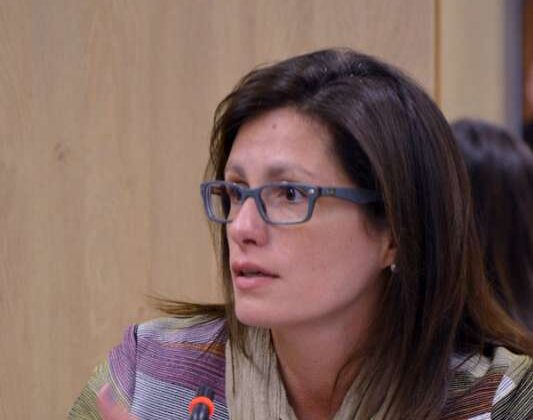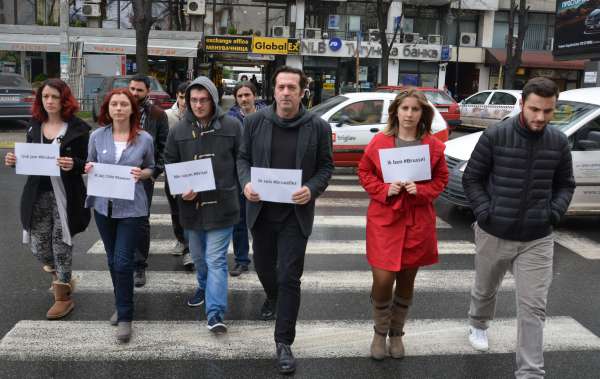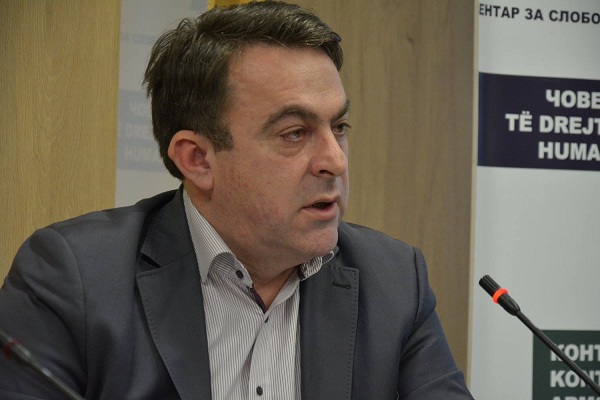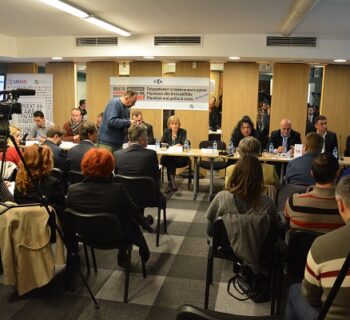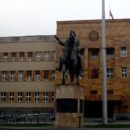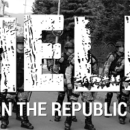Sandra Gavrilovska, lawyer and legal expert, speaks on the legal-political aspects of the political crisis and on the dramatic consequences of the politicization of the state.
Gavrilovska was part of the expert panel discussion on “Pluralism and the political crisis” that was held on March 17, 2016, which left a strong impression on the public as a result of the deep analysis of the election process and political crisis in Republic of Macedonia. The event was part of the project “Free elections for free citizens”, financed by the Ministry of Foreign Affairs of the Federal Republic of Germany.
[youtube width="600" height="400"]https://www.youtube.com/watch?v=jqLEueeekpg[/youtube]
“The general situation in Macedonia is based on the political crisis in the country as of 2001, which has already been determined in the report of the European Commission on Macedonia for 2015. The current political crisis undoubtedly has an influence on the Macedonian democratic setting distorting it to a level of a twisted reality and an illusion. This dramatic situation of the political crisis in Macedonia, among else, also reflects an autocratic and strict party rule and a fragile and anemic democracy.
From a legal perspective, the lost democratic values have a domino effect on the overall functioning of the legal and judicial system that are not functioning properly for quite a long time. We are witnessing a total rule of repression, instead of a rule of law, mass disrespect and violations of laws, as well as a boldly corrupted instead of an independent judiciary, which has been confirmed by recent events with the decision of the institution of the Constitutional Court, as a precedent with serious legal and political consequences, which is why I consider that once again, in an extremely violent manner, it is manifested with the Constitutional banning of the interference of the executive power in the affairs of the judiciary power.
In this context, without respect for the Constitution and the laws, and in the absence of legal protection and security in all spheres of social life and work, the offensive violation of human rights and freedoms along with the serious threats to the freedom of the media and the elections, as absurd as it may sound, are all a logical consequence of the poor governance of the current government and its reckless and irresponsible management of the country. Speaking only from a legal perspective, I believe that there are several preconditions for overcoming the political crisis and for freeing not only the institutions, but also the citizens themselves from the control of the government. In this context, one precondition for overcoming the political crisis are the changes and updating to the Voters Register, which were previously mentioned, and not only in accordance to the updated data from the citizenship records, but also in accordance with the data from the registers of residents, records of current residence of persons and all other official records that can be obtained from the competent authorities. Furthermore, amendments to the Electoral Code need to be made, with provisions for temporary registration of voters staying outside their place of residents in the Voters Register, in order to avoid the need for active registration.
Moreover, I consider that the Electoral Code should finally be amended with misdemeanor, or, penal provisions for all those who participate in the electoral process but do not respect all of the obligations stipulated in the Electoral Code.
Another precondition for overcoming the crisis are the reforms in the electoral model, which is now too late to talk about in this case, but would ensure pluralism on the political scene, as well as greater political and moral responsibility of the people’s representatives, and ultimately establishing an interparty democratization, which is obviously lacking. A precondition and something that we need to insist on is the lawful and transparent functioning of the state institutions, including both the ordinary and special ones, and of the political parties, lawful and transparent functioning of the elections or the election campaigns, without funds from the Budget of Republic of Macedonia, without funds from the budgets of the municipalities and of the City of Skopje, as well as budgets from the public enterprises and institutions. Furthermore, freeing the media from government pressure and transparent reports of the press and media on advertising the participants in the political campaign.
The attempt to find a solution to the issues from which the judiciary and the survival of the democracy depend on resulted in the Przino Agreement, which I will comment only from a legal perspective, as an agreement that entails an obligatory and committed relationship among the participants, and one that means that all participants in this agreement, all parties, are to be equal, conscientious and honest and have an interest in fullfilling the agreement only in the interests of the citizens of Macedonia. I believe that we will be able to see the way out of this political crisis if the implementation of the Przino Agreement is realized in a real legal sense. In terms of civil society, I believe that the influence and the role of civil society is very important in awakening the awareness and in overcoming the existing problems and social deviations. The civil society sector, both individually and together, points to the lack of political dialogue, a low level of political culture in terms of the guaranteed fundamental human rights and freedoms, corruption, lack of transparency, abuse of power, functioning of the public and state institutions solely in the interest of the government and the ruling party, control over media informing, erosive electoral process and many other subjects that are constantly pointed out by the civil society sector, which I believe have had an impact on citizens”.
This post is also available in: AlbanianMacedonian
 Македонски
Македонски Shqip
Shqip English
English
